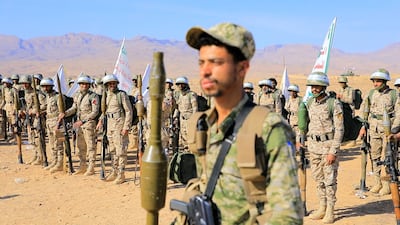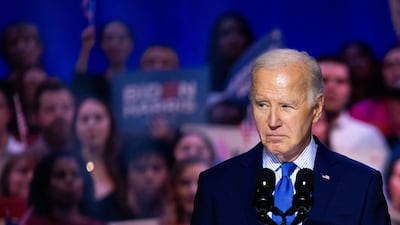The US administration under President Joe Biden is taking a risk by betting on the Iranian regime’s pragmatism and its readiness for regional co-operation even as Tehran’s involvement in Iraq, Yemen, Syria and Lebanon through its proxies challenges American interests in the region.
The success so far in deterring Iran through a carrot-and-stick approach should be seen as part of temporary breakthroughs rather than reflecting a fundamental shift in Tehran’s strategy and ideology. It should also be viewed through the prism of America’s waning influence over the Israeli government.
The Biden White House has effectively placed the fate of its foreign policies in the hands of the ideological extremists in Israel and Iran, where the currency of trust has little value.
Meanwhile, former US president Donald Trump – Mr Biden’s presumptive rival in the November election – is pushing the narrative that the challenger stands for peace while the incumbent stands for war. The implicit suggestion is that Mr Trump’s presidency from 2017 to 2021 was conflict-free, while Mr Biden’s term has been saddled with conflicts in Ukraine, Gaza and the Red Sea.
Regardless of Iran’s denial, the Houthis have disrupted international navigation in the Red Sea with Tehran’s blessing. The Houthis’ military capabilities are not homegrown but provided by Iran’s Islamic Revolutionary Guard Corps with help from Hezbollah in Lebanon. The goal is to execute Iran’s agendas under the pretext of supporting Palestinians in Gaza.
The Biden administration’s problem is that it is attempting to take the middle ground between diplomacy and ultimatums, hoping to avoid having to carry out its threats. But the limited US and UK military operations against the Houthis this month are unlikely to eliminate the group or its considerable arsenal, if the White House avoids directly holding Tehran responsible.


Washington has demonstrated a need for Iranian goodwill and a readiness to reward it. It believes Mr Biden’s efforts have succeeded in containing the Gaza war and prevented its escalation into a regional war. But the Trump campaign team accuses the Biden administration of political naivety.
They say the main reasons behind Tehran’s co-operation is its inability to engage in a military confrontation with an Israel that has US support. Second, Iran does not have to get itself directly involved in a war with Israel and against American interests as long as its proxies can do this job for it. Third, Tehran requires strategic patience until it completes its nuclear weapons programme, perhaps within a year. Therefore, Iranian goodwill should be seen as an investment that buys time to develop nuclear capabilities.
The Biden administration is constrained by its desire to negotiate a peace settlement in Yemen that would require appeasing the Houthis. It had removed the Houthis from the terrorist list three years ago in the hope of enticing them into a deal, but also to illustrate what it believed to be recklessness on the previous Trump administration’s part when it designated the Houthis as terrorists and tore up the nuclear agreement with Iran.
Today, the Biden administration finds itself between a rock and a hard place.
On the one hand, it cannot sit idly by as the Houthis disrupt shipping and trade. As a result, it has opted to launch limited strikes on the group rather than have an outright war against it. On the other, it realises that its operations will not eliminate Houthi military capabilities, which limits the effectiveness of its strikes.
More significantly, Washington appears willing to go with Tehran’s claim that it has no direct involvement in Houthi operations and that it has not provided new weapons to the group. The reason behind Mr Biden’s reluctance to challenge Iran’s deniability is its determination to ensure that the latter continues to refrain from escalation in the region.
The Trump team paints this strategy as effectively surrendering to Iranian blackmail, which, it says, reflects the weakness of the Democratic Party itself. But Democrats like to remind Republicans that it was one of their leaders, former president George W Bush, who effectively allowed a weakened Iraq to come under the Iranian regime’s influence by invading and occupying it. When Mr Bush “purged” Iraq and its army of the governing Baathists, he effectively contributed to the creation of ISIS. Iran used its own offensives against ISIS as an excuse to expand its control over Iraq through proxies.
Tehran has over the years “institutionalised” its influence within the Iraqi government. It continues to violate its neighbour’s sovereignty and that of other countries in the region, such as Syria and Yemen, providing military and political support to non-state forces and militias under its command.
The problem with the Biden administration is that it has chosen diplomatic investment with Iran, while Tehran still invests militarily with the purpose of causing problems for Washington. It continues to support factions and militias vehemently opposed to the American presence in the region.
While diplomacy might be a useful tool to avert conflict across the Middle East, it does not amount to a strategy. For as long as the Biden administration treads cautiously in its policies towards both Israel and Iran, it is likely to struggle to make the necessary leap from transitional arrangements to the grand deal it dreams of for regional settlement.
Of course, some believe diplomacy is the only effective way forward, and that the Biden administration might be able to build on its efforts to eventually create a grand settlement. Whether it succeeds in this regard, only time will tell.





















